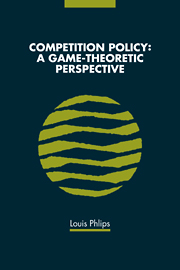2 - Four are few and six are many
Published online by Cambridge University Press: 23 September 2009
Summary
From a methodological point of view, the message of this chapter is that explicit collusion can and should be analysed as the solution of a noncooperative game. A cartel will appear as a non-cooperative Nash equilibrium: each cartel member decides to join the cartel because joining is his best reply strategy. In particular, to accept a production quota is a best reply. In part II, tacit collusion will also appear as a non-cooperative Nash equilibrium (of a repeated game) and so will partial collusion in part III: the non-cooperative approach thus appears as the general methodology appropriate for an analysis of collusive as well as non-collusive equilibria, for the simple reason that one has to explain why each firm has an individual interest to use the collusive strategy.
There is an important proviso, however: in this chapter, problems of imperfect information and of incomplete information are ignored. When imperfect information is allowed for, so that the players cannot observe the actual behaviour of their competitors, it becomes possible to cheat on an agreement. Then the cheater has to be identified and punished: this is the problem of cartel enforcement tackled in section 4.1.
- Type
- Chapter
- Information
- Competition PolicyA Game-Theoretic Perspective, pp. 23 - 38Publisher: Cambridge University PressPrint publication year: 1995



